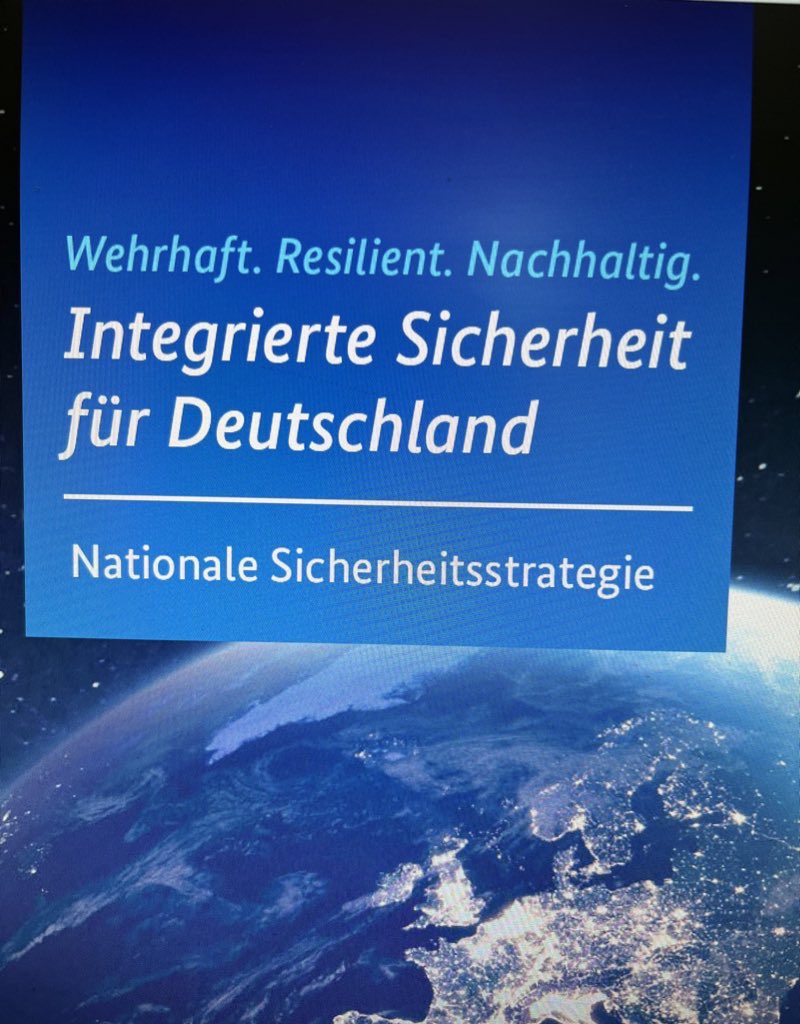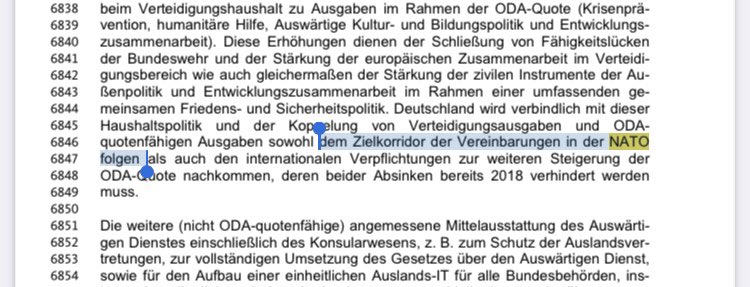I read Germany’s new national security strategy so you don’t have to.
(Though, it’s not a terrible read, so don’t let me keep you).
Thread with some thoughts and main points according to, well, me.
#Sicherheitsstrategie

(Though, it’s not a terrible read, so don’t let me keep you).
Thread with some thoughts and main points according to, well, me.
#Sicherheitsstrategie


First the tldr: it’s s fine.
It says the right things, in the right tones. Nothing major was forgotten, nothing major gotten wrong (biggest bone of contention, imo, is 🇨🇳 and “multipolarity” ). It, however, also doesn’t really say anything particularly surprising or substantial.
It says the right things, in the right tones. Nothing major was forgotten, nothing major gotten wrong (biggest bone of contention, imo, is 🇨🇳 and “multipolarity” ). It, however, also doesn’t really say anything particularly surprising or substantial.
Now that I have lost 90% of the readership, let’s dive into the details 😂.
The heart of the strategy is the idea of a wide security definition. Integrated security. It’s not a white book, it’s not (only) about defence. It’s about resource security, energy security, climate security (a big one). Pandemics, disinformation all that 



Personally I am not the biggest fan of including everything in security, but I think it works here.
#securitisation
#securitisation
Oh, and btw, you can get the English version of the strategy- from which I am also taking my screenshots - here: nationalesicherheitsstrategie.de/National-Secur…
The last screenshot was from Baerbock (foreign minister)’s intro to the strategy. She also has this very good line. 

To keep things interesting, let’s start with the two points that I expect to be most controversial: multipolarity, and China. This 👇is from the executive summary. 

On multipolarity: the strategy uses multipolarity as a descriptive term of where the world is/is moving toward. Thing is, multipolarity has also been a talking point of China and others as something they want, specifically *to oppose a system dominated by the US/the west.*
I think it’s ok here, as in my view the strategy just wants to say that there are more and more important players around. But as an analytical and prescriptive term it’s usually something the west/US isn’t too happy with.
If I may, and if you speak German, I want to recommend our last @Sicherheitspod discussion on exactly that topic
sicherheitspod.de/2023/05/11/72-…
sicherheitspod.de/2023/05/11/72-…
And then China. “China is a partner, competitor and systemic rival”. That kind of trifecta has been used by EU and other before. 

China is mentioned six times in the strategy. It is criticised - for human rights disregard, putting pressures on others, and trying to remodel the international order. But the strategy also points out that China is needed on some crises. 



So, the German government is trying to walk a very, very thin line between the US’ confrontational approach and a more cooperative - not just business-friendly, but also climate-change-cooperation - approach. It’s difficult. Many won’t like it.
But personally I don’t think any other approach - certainly not a more friendly one, but also not the more confrontational approach - would be better.
A bit less good.
Not because of the pledge, that’s good. But it’s a bit fuzzy. “Average over multi-year period”.
So far it doesn’t look as if this funding is actually secured (as journalists pointed out during the press conference).
Not because of the pledge, that’s good. But it’s a bit fuzzy. “Average over multi-year period”.
So far it doesn’t look as if this funding is actually secured (as journalists pointed out during the press conference).

Something that surprised me a bit is that the strategy is very clear on EU enlargement plans. Not something I necessarily expected in there. 

The fact that Germany has a feminist foreign policy is mentioned six times in the document.
As someone who isn’t the biggest fan of feminist (security and defence) policy, I didn’t find it overbearing.


As someone who isn’t the biggest fan of feminist (security and defence) policy, I didn’t find it overbearing.



The line on arms exports I found disappointing. I mean, do you know more once you read it than you did before? I don’t. 

A few examples of what I say at the beginning, saying the right things in the right tone. That’s important, especially as this is the very first national security strategy. 





Before this thread gets too long, let’s keep going with the most important stuff. Russia is of course in there, but it’s absolutely not dominating. 

Climate security is in there a lot, and rightly so. That the strategy was spearheaded by the foreign office (which is led by a Green foreign minister) certainly influenced this but I think (hope) this would have been central no matter.
A somewhat minor point, but one that bugs me is this. 👇
Can’t see anything wrong with it? I don’t like the Aachen treaty reference .
Because- and I said this at the time of the treaty too - this whole extra mutual assistance commitment isn’t great for article 5 or 42.7.
Can’t see anything wrong with it? I don’t like the Aachen treaty reference .
Because- and I said this at the time of the treaty too - this whole extra mutual assistance commitment isn’t great for article 5 or 42.7.

I always felt that such extra “well, when YOU get attacked we really come” guarantees are bad news for article 5 & 42.7. Because if they stand, why the need for an extra assurance?
Anyway, the strategy doesn’t create this, but still, I would stick with 5 & 42.7.
I’ll end with this part on the European pillar of NATO and European Sovereignty (they don’t actually mention the term!) that I like. Strengthen the European pillar of NATO AND become able to do more on your own. 🤝 

I’ve you’ve made it to here, congratulations! You get to see what those who made it to the end of the #Sicherheitsstrategie get to see : a commitment that this is only the beginning.
If there is one thing, this gov & I can agree it’s #weneedtotalkmoreaboutSicherheitspolitik.
If there is one thing, this gov & I can agree it’s #weneedtotalkmoreaboutSicherheitspolitik.

And PS: I did an earlier thread on the #Sicherheitsstrategie press conference- it also mentions the discussion around the national security council which Germany isn’t getting
https://twitter.com/rikefranke/status/1668845551364833281
Sorry for not including more memes and gifs.
• • •
Missing some Tweet in this thread? You can try to
force a refresh













